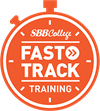SBBCollege Heating, Ventilation, and Air Conditioning - HVAC Training Program

The HVAC training program at SBBCollege prepares students for such careers within the industry as HVAC installers, service technicians, and repair technicians.
 Get trained and ready to work in about 10 months.
Get trained and ready to work in about 10 months.
The HVAC training program is delivered through a combination of practical laboratory work along with classroom instruction that is delivered by instructors who are themselves, experienced HVAC professionals. Throughout the HVAC training program students will become proficient in the installation, maintenance, diagnostics and repair of heating, ventilation, cooling, and refrigeration equipment commonly used in residential, commercial and industrial structures.
Students begin developing their essential HVAC knowledge from the beginning of the program. Along with classroom instruction, students receive practical experience in the on-campus HVAC lab and receive relevant fieldwork experience organized through the College’s externship program.
Top candidates are problem solvers who have an interest in mechanical or technical challenges. Once out in the field, strong customer services skills are important. Previous experience in a related field may be helpful but is not required.
Study for this course at:
HVAC Training & Courses

Courses in the curriculum include:
Listed below are some of the courses included in this comprehensive fast-track HVAC training program:
- Heating and Heat Pumps
- Cooling and Refrigeration
- Leak Detection, Evacuation, Recovery and Charging
- Soldering, Brazing and HVAC Piping
- Basic Electricity, A/C and Compressors
- Control Circuit and Motor Troubleshooting
- Ducts, Ductless Systems and Vents
- Air Quality and Distribution Systems
- Refrigerants, Air Balancing and Airside Systems
- Commercial and Hydronic Systems
The program can be completed in four 10-week terms. Graduates are prepared to sit for the Universal EPA Section 608 and Universal R-410a Certification exam.
HVAC Careers
Employment of heating, air conditioning, and refrigeration mechanics and installers is projected to grow 21 percent from 2012 to 2022, faster than the average for all occupations. There are many careers available to people with HVAC knowledge.
Commercial and residential building construction will drive employment growth as the construction industry continues to recover from the recent recession. The growing number of sophisticated climate-control systems is also expected to increase demand for qualified HVACR technicians.

Climate-control systems generally need replacement after 10 to 15 years. As a result, many homes and commercial buildings that were constructed between 2002 and 2006 will need replacement climate-control systems, further spurring demand for technicians.
The growing emphasis on energy efficiency and pollution reduction will also require more HVACR technicians as climate-control systems are retrofitted, upgraded, or replaced entirely. In addition, regulations prohibiting the discharge and production of older types of refrigerant pollutants will result in the need to modify or replace many existing air conditioning systems.
Job opportunities for HVAC technicians are expected to be excellent, particularly for those who have completed training at an accredited technical school or through an apprenticeship. Candidates familiar with computers and electronics, as well as those who have developed troubleshooting skills as part of thier HVAC training, will have the best job opportunities as employers continue to have difficulty finding qualified technicians to work on complex new systems.
Technicians who specialize in installation work may experience periods of unemployment when the level of new construction activity declines. Maintenance and repair work, however, usually remains relatively stable. Businesses and homeowners depend on their climate-control or refrigeration systems year round, and must keep them in good working order, regardless of economic conditions.
Heating, Air Conditioning, and Refrigeration Mechanics and Installers Percent change in employment, projected 2012-22:
- Heating, air conditioning, and refrigeration mechanics and installers 21%
- Total, all occupations 11%
- Installation, maintenance, and repair occupations 10%
Bureau of Labor Statistics, U.S. Department of Labor, Occupational Outlook Handbook, 2014-15 Edition, Heating, Air Conditioning, and Refrigeration Mechanics and Installers, on the Internet at http://www.bls. gov/ooh/installation-maintenance-and-repair/heating-air-conditioning-and-refrigeration-mechanics-and-installers.htm
Apply to our HVAC Training Program

Our admissions associates are ready to talk to you about how our HVAC training program can help to shape your future career. They can discuss the program in detail, talk you through the application process and let you know about the finance options that are available.
We have programs that can meet your needs and suit your circumstances. Don’t delay; contact our admissions department now for more details about how SBBCollege can change your life forever!
The Higher Education Act of 1965 (HEA), as amended by the Higher Education Opportunity Act of 2008 (HEOA), requires postsecondary education institutions to distribute or make available consumer information, including graduation rates, median debt of graduates, and other important information.
Bakersfield | Rancho Mirage | Ventura | Santa Maria
Financial aid is available to those who qualify. Programs vary by campus location.
Program Highlights:
- Get trained in just four 10-week terms
- Affordable hands-on training
- HVAC labs with industry standard equipment
- Scholarships and financial aid for those who qualify
- Job-placement assistance
